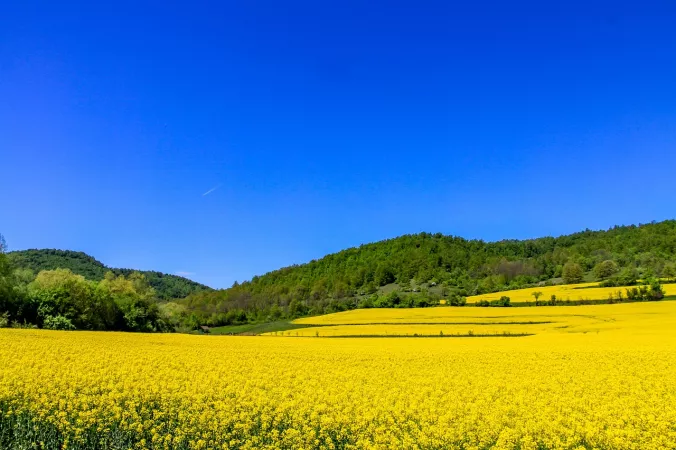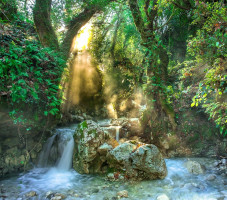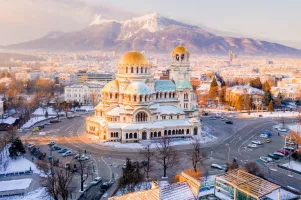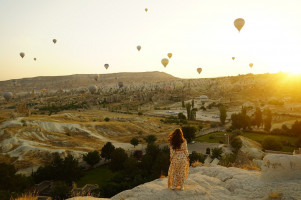
Bulgaria
Duration
7 to 10 Days
7 to 10 Days
Best time to visit
May-Jun, Sep
May-Jun, Sep
Theme
Hill Station, Adventure, Heritage
Hill Station, Adventure, Heritage
Bulgaria Travel Guide
Bulgaria, located in Southeast Europe, is a country known for its rich history, diverse geography, and vibrant culture. With roots dating back to ancient civilizations, Bulgaria boasts stunning landscapes, including mountains, beaches, and historic cities. The country is famous for its unique blend of Eastern Orthodox traditions, delicious cuisine, and warm hospitality.Top Attractions in Bulgaria
- Rila Monastery
- Black Sea Coast
- Plovdiv Old Town
- Veliko Tarnovo
- Seven Rila Lakes
Bulgaria is Famous for
Rose Valley - Bulgaria is most famous for its production of rose oil, known as "liquid gold," used in perfumes and cosmetics worldwide.Top Attractions in Bulgaria
- Exploring the ancient ruins of Nessebar
- Hiking in the Pirin National Park
- Visiting the Thracian Tomb of Kazanlak
- Relaxing in the mineral springs of Velingrad
- Sampling traditional Bulgarian cuisine
What's Great about Travelling to Bulgaria?
- Rich cultural heritage
- Scenic landscapes
- Affordable prices
- Warm and welcoming locals
What's Not So Great about Travelling to Bulgaria?
- Language barrier in some areas
- Public transportation can be unreliable
- Some tourist areas can be crowded
Travel Tips for Bulgaria
- Check visa requirements before traveling
- Use reputable transportation companies
- Be cautious of pickpockets in tourist areas
- Respect local customs and traditions
Important Bulgaria trip information
- Ideal Duration: 7-10 days
- Best Time to Visit: May to September
- Nearby Airports and Railway Stations: Sofia Airport, Plovdiv Airport, Sofia Central Railway Station
Per Person
68,897
*EXCLUDING APPLICABLE TAXES 5.0 Ratings
( 396 Reviews )
( 396 Reviews )
Per Person
2,34,567
*EXCLUDING APPLICABLE TAXES Per Person
1,85,313
*EXCLUDING APPLICABLE TAXES 5.0 Ratings
( 16 Reviews )
( 16 Reviews )
Per Person
1,85,313
*EXCLUDING APPLICABLE TAXES Per Person
1,50,000
*EXCLUDING APPLICABLE TAXES Per Person
1,85,313
*EXCLUDING APPLICABLE TAXES 5.0 Ratings
( 6 Reviews )
( 6 Reviews )
FAQ's on Bulgaria
Q1: What is the best time to visit Bulgaria?
The best time to visit Bulgaria is during the spring and summer months, from May to September. During this time, the weather is pleasant, and you can enjoy outdoor activities like hiking, beach trips along the Black Sea coast, and exploring historical sites. The peak tourist season is in July and August when many festivals and events take place across the country.
Q2: Do I need a visa to travel to Bulgaria?
Most EU citizens do not need a visa to travel to Bulgaria for stays up to 90 days. Visitors from other countries should check the visa requirements based on their nationality. It is advisable to have a valid passport with at least six months validity beyond the intended stay.
Q3: What are the must-visit attractions in Bulgaria?
Some of the must-visit attractions in Bulgaria include the ancient city of Plovdiv, Rila Monastery, the capital city of Sofia, the picturesque town of Veliko Tarnovo, and the stunning Rila Mountains. Don't miss exploring the charming coastal towns on the Black Sea and the unique rock formations at Belogradchik Rocks.
Q4: Is Bulgaria a safe place to travel?
Bulgaria is generally a safe destination for travelers. Like any other country, it is advisable to take usual precautions against pickpocketing and be aware of your surroundings, especially in crowded tourist areas. Avoid isolated areas at night and be cautious when using public transportation.
Q5: What is the local currency in Bulgaria and can I use credit cards?
The local currency in Bulgaria is the Bulgarian Lev (BGN). Credit cards are widely accepted in major cities and tourist areas, but it's advisable to carry some cash for smaller establishments and markets. ATMs are easily accessible in urban areas.
Q6: What is the local cuisine like in Bulgaria?
Bulgarian cuisine is a mix of flavors influenced by Mediterranean, Turkish, and Eastern European cuisines. Must-try dishes include banitsa (cheese-filled pastry), shopska salad, kebapche (grilled minced meat), and tarator (cold cucumber soup). Vegetarians will find plenty of options like stuffed peppers and traditional bean soups.
Q7: What transportation options are available in Bulgaria?
Public transportation in Bulgaria includes buses, trams, and metro systems in major cities like Sofia and Plovdiv. Taxis are also a convenient option, but make sure to use licensed companies. Renting a car is a great way to explore the countryside and visit remote attractions.
Q8: Are there any cultural norms or etiquette I should be aware of when visiting Bulgaria?
When visiting Bulgaria, it's important to greet people with a handshake, maintain eye contact during conversations, and remove shoes when entering someone's home. Bulgarians appreciate punctuality and expect guests to toast during meals. Dress modestly when visiting religious sites and ask for permission before taking photographs of locals. Respect for elders and traditions is highly valued in Bulgarian culture.
Q9: I am a travel agent. How can I buy travel leads of Bulgaria?
Register yourself as a travel agent at agents.tripclap.com and then you can buy travel leads to Bulgaria once your account is approved. For more details contact our support team at +91-8069186564 or support@tripclap.com



